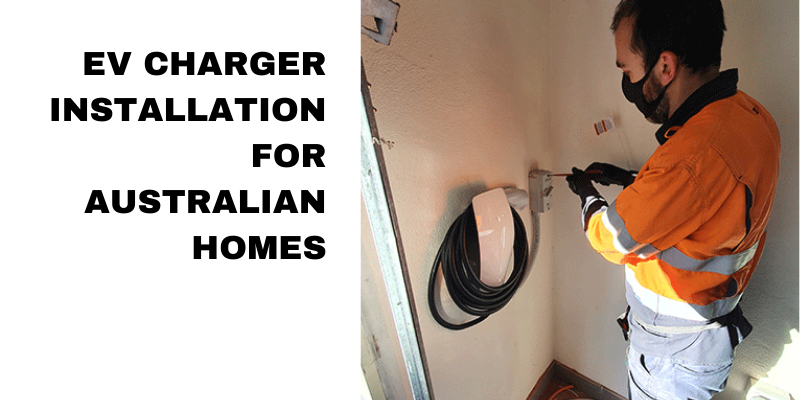The adoption of electric vehicles (EVs) is steadily increasing in Australia, and with it comes the growing demand for efficient home charging solutions. Proper EV charger installation is critical, ensuring compliance with Australian standards, manufacturer guidelines, and the safety of homeowners. The process involves assessing the electrical capacity of the property, choosing suitable equipment and adhering to strict safety measures.
This guide delves into the essential requirements for installing EV chargers at home, covering aspects like electrical evaluations, equipment selection, and the technical specifications necessary for a safe and effective setup.
Assessing Electrical Capacity for EV Charger Installation
Assess your home’s electrical capacity before installing an EV charger. This evaluation determines whether the existing electrical infrastructure can support the added load of an EV charger. A licensed electrician will analyse the electrical system, including the main switchboard and circuits, to identify potential upgrades or adjustments.
Ensuring adequate electrical capacity prevents issues like overheating, tripped circuits, and damage to connected devices. It also allows the charging system to operate reliably without interruptions. A professional evaluation ensures the property complies with safety standards and can accommodate the extra energy demands of an EV charger.
Wiring and Technical Requirements
Proper wiring is essential for the efficient and safe operation of EV chargers. Australian standards such as AS/NZS 3000 and AS/NZS 3008 provide specific guidelines for cable selection, installation methods, and safety devices. The cable size, the type of charger, and the distance from the switchboard, all influence the wiring requirements.
Key technical components include:
- Dedicated Circuit: Each EV charger requires its circuit to prevent interference with other appliances.
- Type A, 30mA RCD: This device protects against electrical faults, ensuring the charger can safely disconnect during an issue.
- Isolation Switch: Though not mandatory, installing an isolation switch near the charger aids troubleshooting and offers a quick disconnection point for emergencies.
Adhering to these technical requirements ensures compliance with Australian safety standards and guarantees reliable charger operation.
Compatibility with Electric Vehicles
Most electric vehicles in Australia, especially those manufactured after 2019, use a Type 2 charging socket. Selecting a charger compatible with this standard ensures versatility across various vehicle brands and models. Older or imported vehicles may require adapters, but these cases are rare. Opting for a universally compatible charger eliminates potential compatibility issues.
Selecting the Right EV Charger
Choosing the correct EV charger depends on the charging speed, energy efficiency, and additional features such as solar integration. A higher charging speed may suit larger vehicles or households with multiple EVs, while solar-compatible chargers offer environmentally friendly options. Consulting a Level 2 electrician in Sydney can help determine the best choice based on the homeowner’s specific requirements.
Licensed Electricians: A Must for EV Charger Installation
Engaging a licensed electrician for EV charger installation is non-negotiable in Australia. These professionals ensure installations meet safety regulations and manufacturer specifications.
Hiring a licensed electrician to install the charger will offer the following benefits:
- Safety Assurance: Evaluating the electrical system for potential hazards and ensuring compliance with AS/NZS standards.
- Warranty Protection: Manufacturer warranties often require professional installation to remain valid.
- Long-Term Reliability: Professional EV charger installation provides a robust and future-proof charging solution.
Licensed electricians are equipped to handle complex installations and provide valuable guidance on optimising charging systems.
Optimal Placement for EV Chargers
The location of the EV charger significantly impacts its efficiency and usability. Key considerations include:
- Convenience: Place the charger near a parking space or inside a garage for easy accessibility.
- Proximity to the Switchboard: Placing the charger near your home’s switchboard will reduce installation time and cost.
- Weather Protection: Outdoor installations require chargers rated for external use and should be shielded from direct sunlight and rain.
- Safety Compliance: The charger must be positioned to avoid potential mechanical damage.
A professional electrician can assess the property and recommend the best placement for the charger to enhance its functionality and safety.
Maintenance for Long-Term Efficiency
Routine maintenance is crucial to ensure ongoing safety and reliability of EV charging systems. Regular inspections by qualified electricians help identify wear and tear, maintain compliance with safety standards, and extend the lifespan of the equipment. Maintenance should include checking connections, testing safety devices, and ensuring all components function as intended.
Qualities of a Reliable Level 2 Electrician in Sydney
Hiring a Level 2 electrician for EV charger installation ensures access to specialised expertise. Look out for the following characteristics in a Level 2 electrician:
- Understanding Requirements: Understand the requirements and offer solutions to meet your needs.
- Quality Workmanship: Delivering durable and compliant installations.
- Transparent Pricing: Providing upfront quotes with no hidden costs.
- Post-Installation Support: Offering guidance and assistance even after the job is complete.
Choosing an experienced professional guarantees peace of mind and a high-quality charging solution.
Transparent Pricing and Exceptional Service
Reputable electricians value transparency, offering detailed quotes that cover the entire scope of the project. This approach eliminates unexpected costs and builds trust. Additionally, they are adaptable to changes, ensuring the installation process remains smooth and stress-free.
Why Partner with a Level 2 Electrician for EV Charger Installation?
EV charger installation at home is a significant investment that requires meticulous planning and professional expertise. From assessing electrical capacity to ensuring compliance with Australian standards, a Level 2 electrician in Sydney provides the knowledge and skills needed for a safe and efficient installation.
The Bottom Line
Thoughtful placement and correct EV charger installation with quality components and regular maintenance will further enhance the charging experience, ensuring long-term satisfaction. Homeowners looking for reliable EV charger installation services should prioritise safety, transparency, and professional support to maximise the benefits of their EV charging systems. Find more contact details on our Google Business Profile.




